Home » Researchers in Residence scheme » Tranche 1 projects
Tranche 1 projects
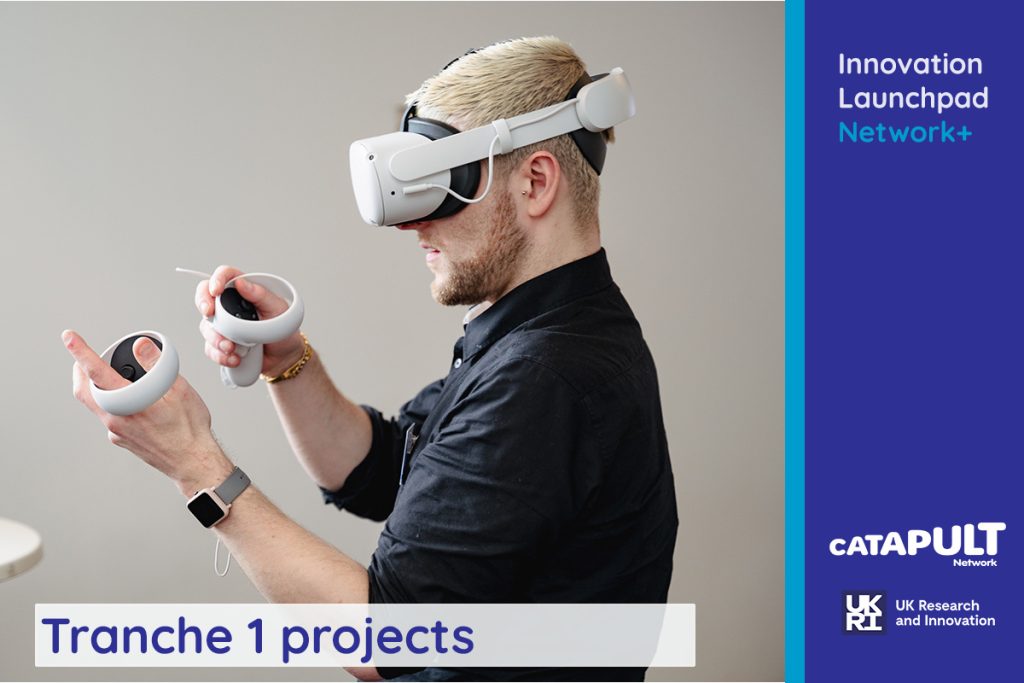
After a successful launch in October 2022, we are delighted to publish the first round of projects from our Researchers in Residence scheme, in their own words.
The first Tranche attracted more than 120 enquiries from 30+ different academic institutions across the UK, with all three key themes (Net Zero, Resilience, Healthcare and Wellbeing) and all 9 Catapult Centres represented in a fascinating portfolio of applications.
Tranche 2 projects can be found here
Net Zero
Whilst the world has been moving towards a circular economy minimising single use plastic production, the Cell and Gene Therapy industry has moved in the opposite direction favouring its use. The plastics used in manufacturing, research and clinical trials become bioprocess waste which is treated as biohazardous material. This bio-waste is sterilised and incinerated alongside biomedical waste from hospitals. Finding a way to recycle both bio-wastes would lower the carbon footprint contributing to Net Zero. Dr Alejandro Sanchez at the Institute for Sustainability University of Bath has expertise in technologies to recycle plastics chemically that should be able to process both biowastes into virgin plastics. Biomedical and bioprocess wastes have a different composition and the Cell and Gene Therapy Catapult aim to collaborate to explore the potential of those chemical technologies. The project will not develop chemical recycling methods. The project will:
a) Identify which method(s) might be appropriate for the healthcare sector, and the Cell and Gene Therapy industry.
b) Determine what technical enhancements to method(s) would be needed to comply with regulations.
c) Identify how the method(s) could be commercialised as technologies to provide resilient, Net Zero and circular economy solutions for the UK and for export.

This work will produce a carbon baseline of the UK space sector for the first time. Firstly, a desk-based exercise will be conducted to evaluate UK Net Zero/environmental policies (including the Scottish Space Sustainability Roadmap) with an aim of identifying gaps and/or high priority impact areas where innovation is needed. The carbon baseline will use a mixture of publicly available research and tools, including the Strathclyde Space Systems Database (SSSD). The SSSD is a dedicated space life cycle sustainability assessment platform developed at the University of Strathclyde. Data will be sought from a variety of companies where the Satellite Applications Catapult and the University of Strathclyde have existing relationships, creating a focus group of representative parties. The collected data will then be extrapolated to depict the entire upstream/downstream landscape and input to the SSSD as the calculation tool. A further analysis will be launched into the technical readiness of solutions for de-carbonisation. Finally, a proposal or government recommendation will be served to Innovate UK, providing guidance to the space sector on viable de-carbonisation pathways. In terms of risks, should not enough responses be received to accurately quantify a carbon baseline, the other three elements of this proposal can still be achieved.

In 2019, global primary energy consumption was 290 million barrels of oil equivalent per day and around 11% contributed by renewable sources (Energy saving trust 2020). Offshore wind energy is one of the most prominent renewable energy resources which is under continuous development. The research in Advanced Materials and Mechanics is of particular importance to offshore renewable energy sector, by delivering the cutting-edge material and mechanical innovations in the offshore renewable energy sector.
This interdisciplinary project will investigate problems within the areas of materials and mechanics, providing timely solutions to guide R&D in condition monitoring (diagnosis and prognosis) for the offshore renewable energy sector. The project content includes: Investigation on the degradation mechanism of subsea cables under the multiphysics environment of mechanical, thermal and electromagnetic fields;
Review and modelling of a composite/metallic Leading-Edge Protection System for turbine blades; Supporting offshore system optimisation by providing composite design and FEA (Finite Element Analysis) capabilities.

Power capacitors, used as energy buffers of an instantaneous power difference for ac/dc power conversion, are primary building blocks for future electrification. There is a pressing need for material innovations to fundamentally address Net Zero’s challenges in power capacitor manufacturing. Compared to commercialised oxide-based capacitors, nitride-based semiconductors such as aluminium nitride and gallium nitride hold strong potential as they are Pb-free, as well as compatible with CMOS and silicon carbide power electronics technology. Currently, metal nitrides are mainly obtained by vacuum deposition processes such as plasma-enhanced chemical vapour deposition, atomic layer deposition and sputtering deposition, which are undesirable for future Net Zero smart manufacturing.
In this Researchers in Residence project, Dr Bo Hou from Cardiff University will work with Compound Semiconductor Applications Catapult on developing and demonstrating high-power capacitors based on liquid-state laser ablation grown compound semiconducting nanocrystal. If successful, significant programme grants and industrial technology transfer collaborations will be leveraged, underpinning the delivery and commercialisation of emerging electrification technologies based on low-carbon footprint compound semiconductor power electronics.
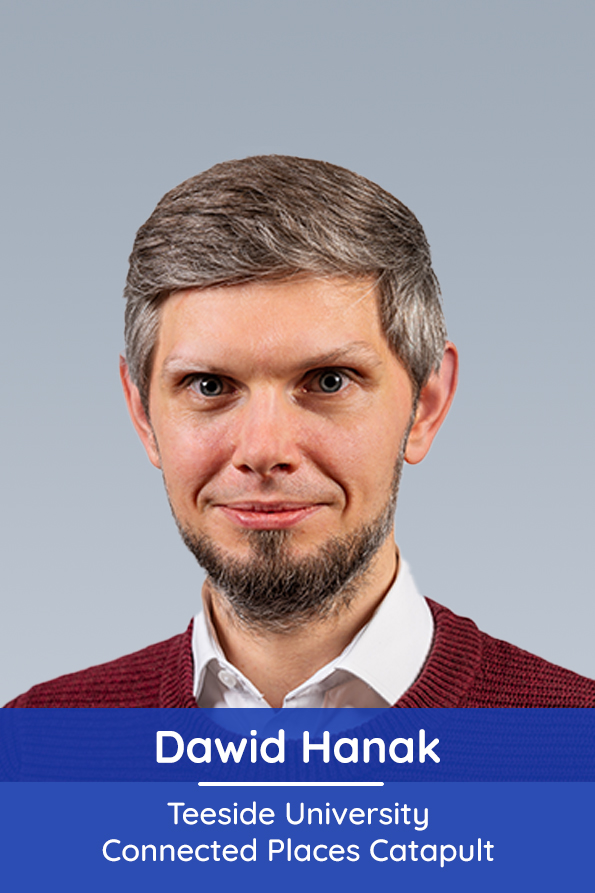
The UK Government has committed to achieving Net Zero emissions by 2050. The transport sector is now the largest contributor of GHG in the UK, producing 107.5 MtCO2 in 2021. While rail transport is already one of the least carbon-intensive modes of transport, reducing non-traction emissions, such as those from station buildings, infrastructure and passenger behaviour, is still a challenge.
To address this issue, we are developing a user-friendly tool that will help us understand the non-traction emissions and identify opportunities and challenges for decarbonising train stations. Using stochastic modelling, we will support end-users in making data-driven decisions to reduce emissions. Connected Places Catapult and Dawid will work with Bristol Temple Meads, Britain’s oldest and largest station, to map and quantify their emissions across all scopes. They will assess energy consumption and building performance, survey passengers and employees, and analyse census data to understand journeys to and from the station. Based on this data, we will identify emission reduction activities, and assess their economic and environmental potential. We will also consider the impact of uncertainty on de-carbonisation pathways.
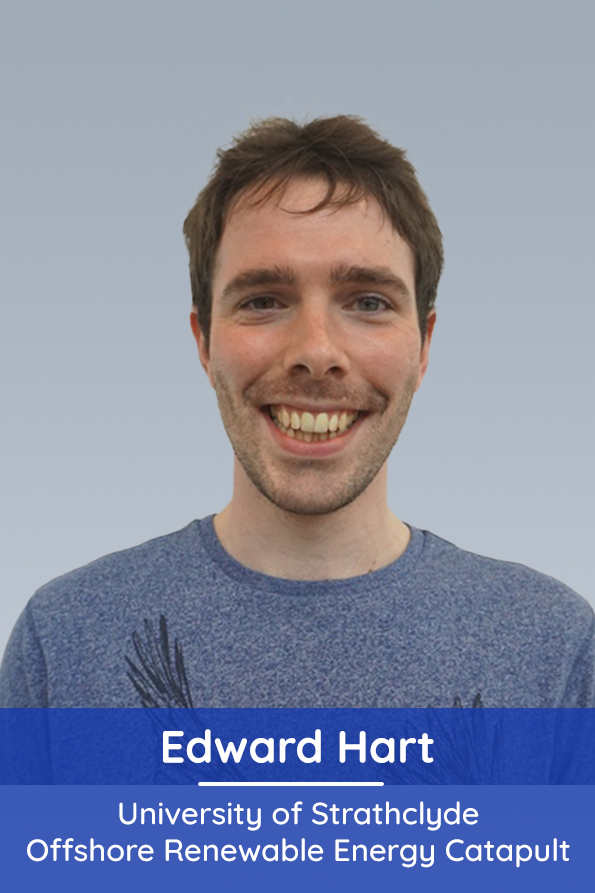
Wind energy is essential to reaching Net Zero by 2050. However, necessary further cost reductions require marked improvements in wind system reliability. Novel and radical wind turbine main bearing redesign is therefore urgently required to address costly premature failures and ensure reliable operation. Innovation is required across the entire framework of main bearing design, testing and validation, as well as for monitoring and assessment processes during the operational phase. This project addresses these challenges for wind turbine main bearings in collaboration with the Offshore Renewable Energy Catapult, Waukesha Bearings Ltd and the University of Sheffield.
Main bearing science and digitalisation techniques will be combined with partners’ state-of-the-art experimental facilities, novel measurement techniques and commercial bearing design experience to deliver an enhanced framework for main bearing design and operational monitoring which accounts for the full-system wind turbine load interactions, and leverages state-of-the-art surrogate modelling. A key contribution of this project will be its focus on accelerating the development and uptake of Fluid Film main bearing solutions, a technology which presents the opportunity to dramatically reduce capital and operational costs for large offshore wind farms through reduced dependencies on component replacements and maintenance activities.

Using the case study of urban renewal in and around Bristol Temple Meads (BTM) rail station this project will apply systems thinking (systems-of-systems and interdependency planning) to co-create a route-map to ’Net Zero Carbon’ for BTM operations with wider generalisability to other transport hub locations. The research will investigate the value of innovations in cyber-physical systems and place-based mathematical models (‘digital twins’) in providing through-life evidence to guide more efficient and effective transitions to Net Zero carbon. The research will span a formative time in the Connected Places Catapult five-year programme to pioneer station innovations at Bristol Temple Meads.

Project title: Enabling Construction Material Circularity in the Transport Infrastructure Sector
The infrastructure industry controls 16% of the UK’s total carbon emissions and has influence over a further 37%, in which transport infrastructure is the primary contributor. Transport infrastructure consists of the fixed installations including roads, railways, waterways, airports, as well as transportation and transit facilities. It has an important role to play in the move to decarbonisation and sustainability. This project will focus on the determination of means to incorporate circular economy in the management of construction materials in transport infrastructure sector. The research will use a combination of literature review, field visits and on-site interviews as the methodology for determining the material circularity potential for asphalt, concrete and steel, etc.
Based on the literature review, the current technologies and innovations enhancing construction material circularity will be summarised. The economic and environmental impacts as well as technology readiness levels will be systematically analysed. Field investigation and interviews will be used to gain insights into the current practices, business and policy models of construction materials management. The possible outcomes of this project will be a circularity framework for construction materials in transport infrastructure sector, as well as pathways and potential strategies for enabling material circularity in transport infrastructure sector.
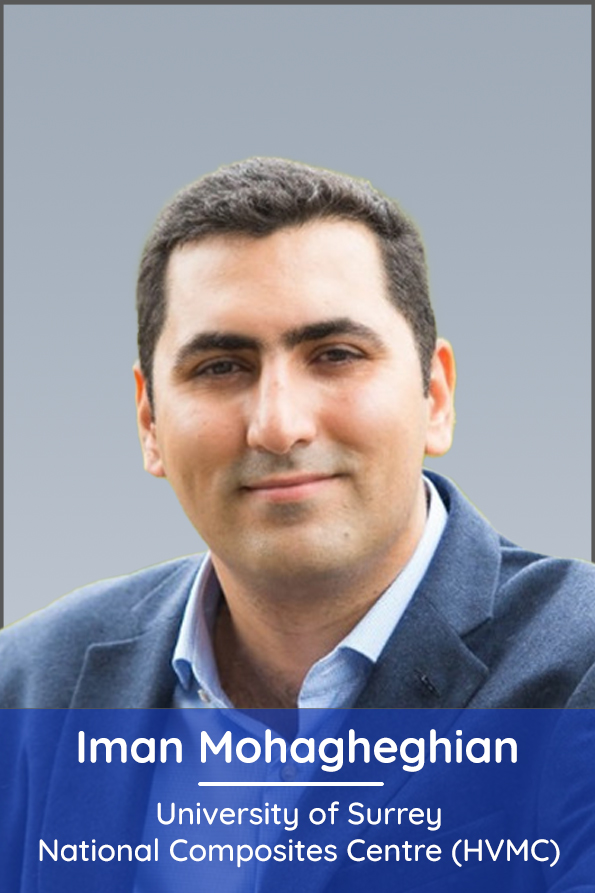
In recent years, Carbon Fibre Reinforced Polymer (CFRP) adaptation in various industries, particularly in aerospace and wind turbine sectors, has been accelerated considerably due to the growing demand for lightweight and strong materials. Wide-spread adaptation, however, has brought the new challenge of increased production waste and End-of-Life components. While Carbon Fibres (CF)s are the highest added-value component in a composite, it is also the most environmentally impacting (i.e. its production is very energy intensive compared to other synthetic fibres). Therefore, to reduce its environmental impact, it is crucial to utilise the great potential of reclaimed Carbon Fibre (rCF) for second-life applications, i.e. to overcome a key barrier in recycling which is the lack of a market or product requiring recyclate. In this project, Iman will be utilising rCF for high-value manufacturing, exploiting the excellent mechanical and conductive properties of rCF. Using rCF for three main application routes has been considered including in: i) fibre metal laminate for automotive industry, ii) conductive filaments for additive manufacturing of flexible sensors, and iii) large scale pressure sensing flooring. Throughout this fellowship, I will investigate the application-specific properties required from CFRP waste, develop processes and protocols for improving the quality of recyclate, establish the know-how of designing with recyclate and finally establish the recyclability routes for new products and end of life assessment. National Composite Centre, as a host Catapult, will help providing the recycled/repurposed waste fabrics and fibres, accessing to knowledge, people and equipment and engaging with whole supply chain.

Tidal Stream Energy is becoming a commercial renewable energy source. The first Contracts for Difference have been awarded increasing the capacity installed in the UK to 51.2MW 2027. Top quality resource modelling and uncertainty analysis is required for these projects to be an engineering and economic success.
This project will leverage a state-of-the-art coupled flow-wave model the English Channel, developed during the successful EU Interreg-Channel Tidal Stream Industry Energiser project (TIGER) to provide developers and the ORE Catapult with best-in-class data for tidal stream developments.
Technology developers often utilise simplified models to estimate the yield, which tends to be short-term and does not sufficiently consider long-term uncertainties and sensitivities. Simulated data is essential to calculate power production, establish engineering design envelopes and for O&M strategies, all of which form the basis for Cost of Energy calculations.
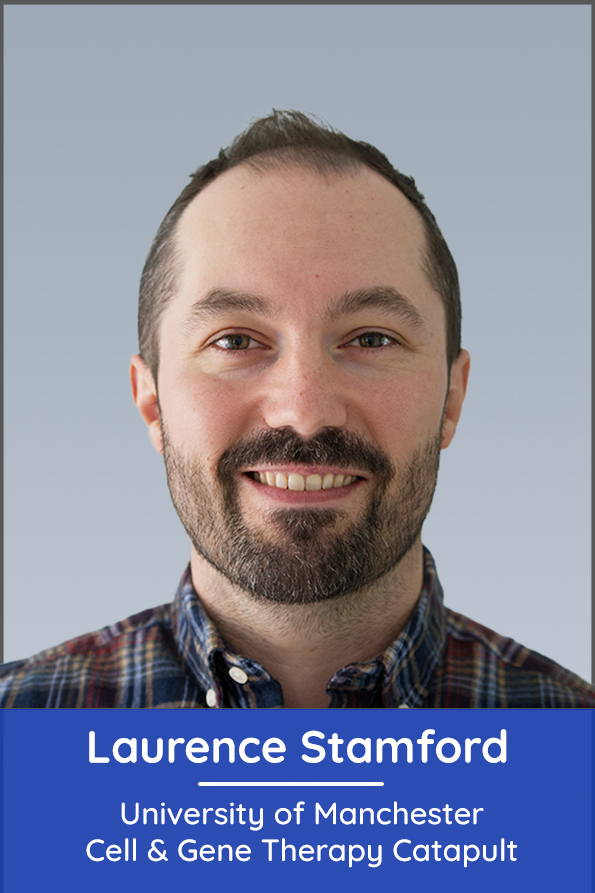
The environmental impacts of healthcare provision are diverse, substantial and poorly understood. This leads not only to unintended impacts on our environment, but undesired impacts on human health caused by air, water and land pollution. In the UK, for instance, the NHS’ total carbon footprint is equivalent to roughly 6% of total UK emissions, while hundreds of thousands of tonnes of medical supplies are produced and incinerated per year, adding to harmful emissions. The healthcare sector increasingly recognises these problems, as exemplified by the Health and Care Act 2022 and the NHS’ Net Zero plan.
This project focuses on integrating life cycle thinking and life cycle assessment into cell and gene therapy development so that we can minimise environmental impacts (climate change and others) in a targeted, science-based manner. The three main aims are:
1. Make the UK a leading voice in sustainability for the sector by establishing long-term collaborations between academia, the Catapults, and businesses, focused on
sustainability;
2. Conduct the first cradle-to-grave environmental assessment of a gene therapy production process to identify strategic ways to reduce those impacts in future; and
3. Embed life cycle sustainability expertise into the Cell and Gene Therapy Catapult so that all industrial partners can minimise their impacts.
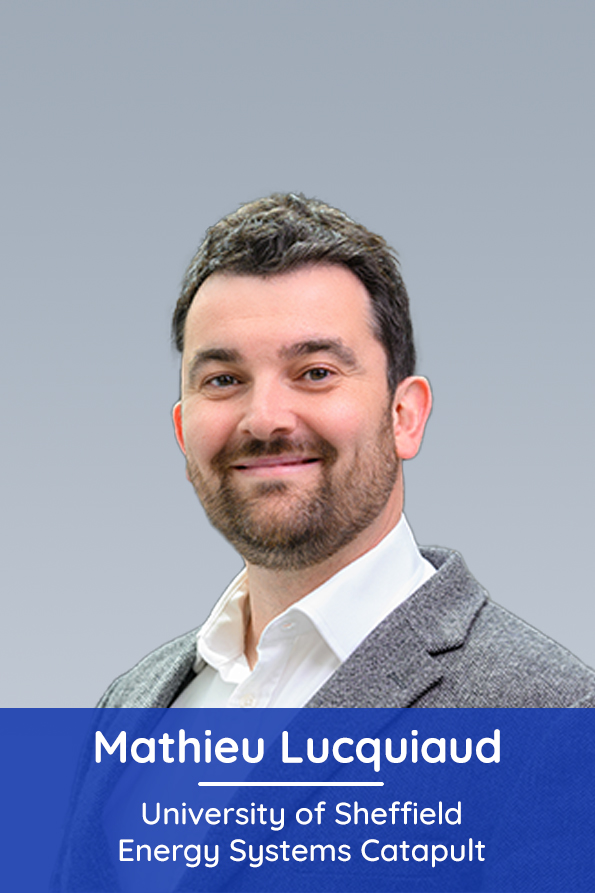
Maintaining the operability and reliability of the UK energy system is critical to its resilience and the security of energy supply. This must continue whilst decarbonising energy generation to zero residual emissions. The project examines the operation of UK net-zero energy systems where Carbon Capture and Storage (CCS) technologies are used.
It uses techno-economic, whole system models of the Energy Systems Catapult used to provide evidence on decarbonisation pathways to government, industry and third sector stakeholders.
The project creates impact by adding robust representation of emerging practices in CO2 capture technologies and CO2 transport and storage networks and evaluate their contribution to minimise the cost of achieving net zero energy generation in the UK. It targets impact from four key areas of research and industrial development.
- Operation of CCS with 100% capture for zero residual CO2 emissions at the point of electricity, heat, and hydrogen production
- Emerging techniques to eliminate start-up and shut-down emissions of CCS power plants.
- Flow balancing in CO2 transport and storage networks and the interplay of the electricity, gas, hydrogen and CO2 transmission networks.
- Valuing ways of removing excess CO2 from the atmosphere in the waste management sector
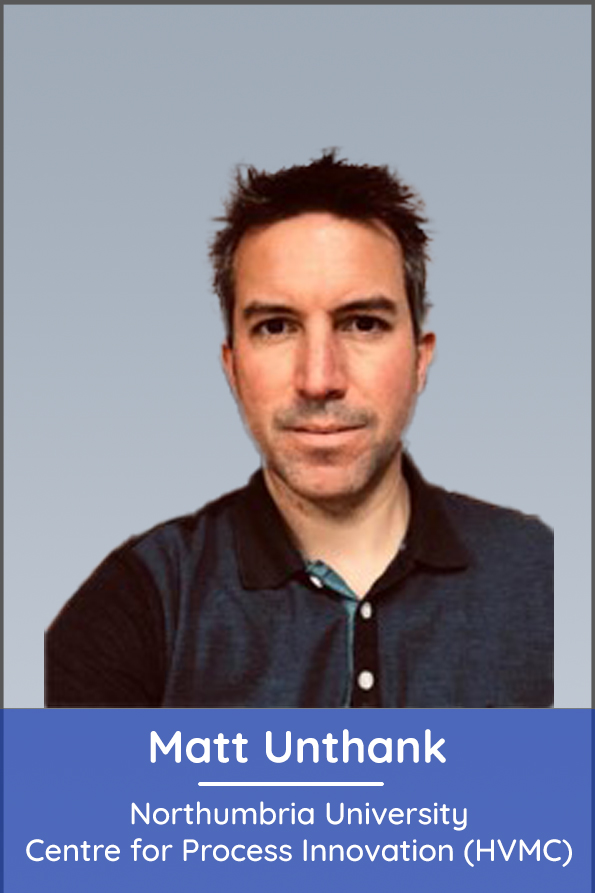
This project will expediate the development, testing and scale-up of sustainable, recyclable and repairable polymers and polymer-composites, suitable for high-performance structural applications, including wind turbine blades, lightweight transport vehicles and aircraft. At present thermoset polymers used in these applications (e.g. epoxy composites) are not recyclable or repairable and are therefore destined for landfill or incineration at end-of-life. It is our vision to build upon our recent developments in sustainable polymeric materials and to help deliver the UK’s ‘Net-Zero’ ambition. Research at Northumbria University (Dr. Matt Unthank, PI) has identified novel polymerisation strategies that allow the formation of high-performance thermoset materials which combine highly sought-after properties with sustainability. These include materials that can be deconstructed, separated and reconstructed at end-of-life and have the potential for easy-repair or self-healing.
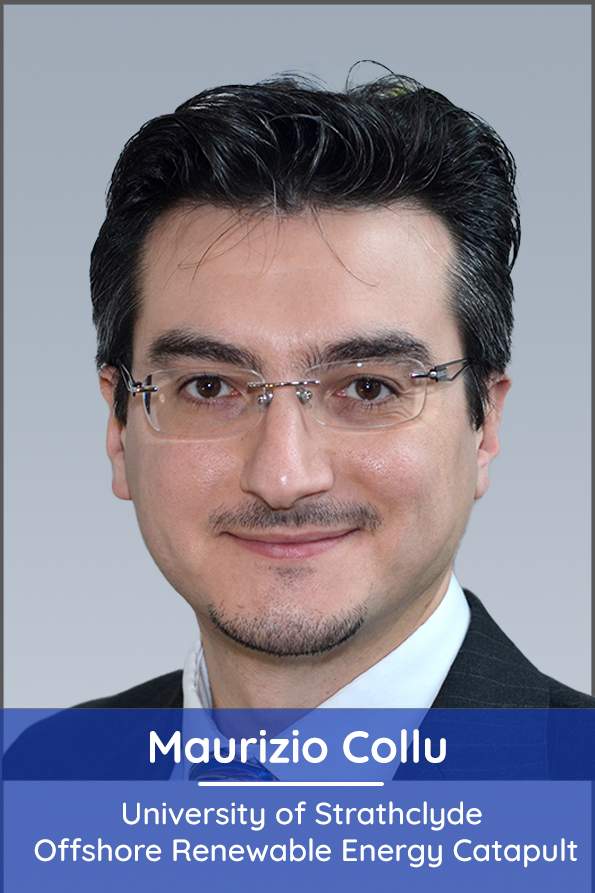
50GW of offshore wind (5GW floating) and 60% local UK wind turbine content by 2030 is the UK Offshore Wind Sector Deal target, but at present only ~13.6GW (0.08GW floating) are operational, with a content of 48%: a substantial change is needed.
The international research community and the industry suggests a “systems engineering” approach, i.e. an approach that takes into account all the components of the wind turbine and their interactions since the beginning of the project, as the next necessary step – but the change of current approaches are perceived as too risky by the industry.
It may seem strange but, at the moment, the companies designing and manufacturing the rotor, the nacelle, and the tower (i.e. the “dry” parts) are put in touch with the companies designing the floating support structure at a very late design stage, when the rotor, nacelle, and tower designs are almost finalised.
Therefore, the research hypothesis is that: “by developing a “whole system”, multidisciplinary design, analysis, and optimisation (MDAO) framework, and by applying it to an industrially relevant case study, it will be possible to quantitatively demonstrate that overcoming these techno-economic challenges is the most attractive option despite the risks


This project evaluates a recent Energy Systems Catapult digital twin demonstrator project (https://es.catapult.org.uk/project/energy-system-digital-twin-demonstrator-project/), asking questions on:
- Collaboration: How do stakeholders collaborate, enabling secure, interoperable, and private data sharing?
- Evidence: Which model assumptions are deemed ‘good enough’ for digital twins to work? Which policy insights cannot be included in the model? How exactly will digital twins be exercising political influence?
By the end of her residence, Ola will develop a toolkit for embedding ethical considerations in science advice and digital twins, including surveillance, bias, privacy, and security risks relevant to digital twins. She will also deliver a report on democratising digital twins, analysing interactions between modelling and policymaking.
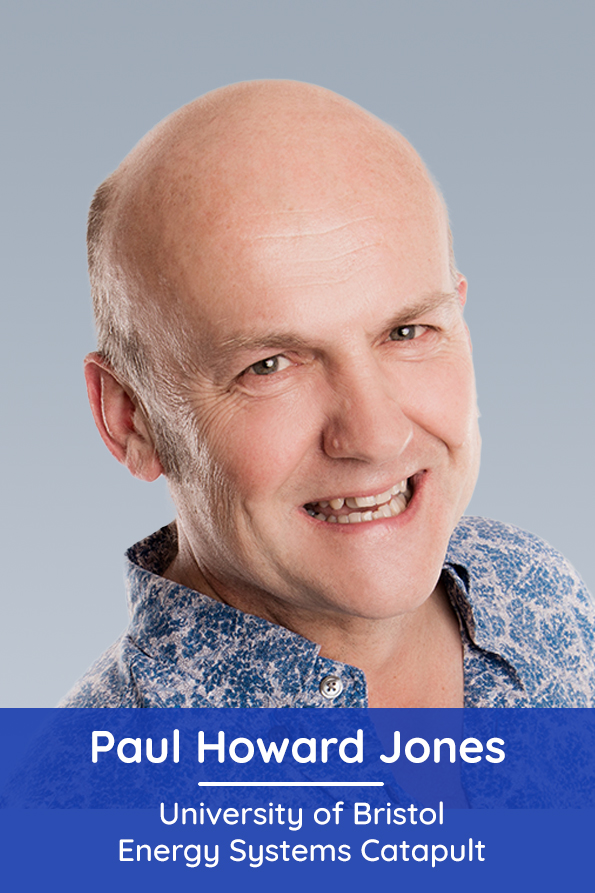
Consumer commitment to renewable energy technologies (such as heat pumps for home heating) is crucial for UK ambitions to reach Net Zero, necessitating a long cognitive and emotional journey for many consumers. This project draws on psychology, neuroscience and education to frame the customer’s ‘learning journey’ from current to future energy worlds, identifying factors contributing to trust and positive responding, as well as potential touchpoints and levers to support consumer adoption of renewable energy.
By the end of his project, Paul hopes to have identified key insights for informing communication with consumers through academic review and a parallel process of dialogue and consultation with users of the review (representatives of big energy companies and SMEs, product managers/innovation managers within the energy sector, and policy makers from BEIS and local authorities). It is hoped that combining expert interpretation of the literature with the expertise, professional aims and experience of energy companies will assure the relevance, validity and dissemination of findings.

The project aims to make the power electronics core of power converters responsive to operating conditions and functional degradation toward the technology roadmaps. This will be achieved by detection of change in SiC devices and to determine how to control the devices to prevent it. This would permit SiC devices to be operated safely at higher switching speeds and thus efficiencies, than current datasheet limits allow.

Gallium Nitride (GaN) transistors are key components used for power conversion in Net Zero applications like electric vehicles. They have lower power loss and faster switching speed than Silicon MOSFETs and hence are ideal for enhancing energy saving and power density. However, the thermal performance of GaN transistors is less well understood and this could lead to deficient reliability of GaN-based applications. This Researchers in Residence Innovation project aims to provide new knowledge on the accurate thermal characterisation of GaN transistors.
This project aims to develop a non-invasive, fast and accurate method of measurements to characterise the coefficient between temperature-sensitive electrical parameters (e.g., gate voltages), junction temperature and the thermal network of the GaN devices. A platform consisting of high-speed data acquisition system, temperature control units and transistor testing boards will be built to extract and validate thermal models of GaN transistors. The project’s outcome will significantly enhance the Catapult’s capabilities to serve the UK industry in thermal modelling/simulation and bring together partners from across the universities and industries on the Net Zero grand challenge.

This project focuses on obtaining industry-relevant performance testing of battery anodes produced using our ground-breaking, sustainable and scalable method. Energy storage is crucial in the modern society due to the need to lower carbon emissions and the widespread increase in electrification. Lithium-ion batteries (LIB) is the storage method of choice, however lowering manufacturing costs, increasing energy densities and faster charging will be required moving forward. Porous silicon is one of the most promising materials being explored as an anode, enabling it to store almost 10x more charge than the presently used graphite. However, porous silicon has proven difficult to incorporate into commercial batteries because producing the desirable unique structure and properties have proven difficult. We have invented a low-temperature and cheaper method to produce the desired grade of porous silicon at scale. We will be performing extensive commercially-relevant performance testing to develop the first economical and sustainable bulk manufacturing of porous Si for next-generation batteries.
Resilience

Tackling Violence against Women and Girls (VAWG) (Home Office 2022) is a key policy concern, yet limited attention has been afforded to VAWG on public transport (PT). Fear of victimisation is a barrier to travel, reducing the connectedness of places. A 2022 DfT commissioned study identified 13 recommendations to tackle VAWG on PT. Recommendation 9 (long-term-goal) is to ‘create a national, intelligence database which captures incident reporting from all transport modes and areas.’ I argue for accelerating this as an immediate priority. The ‘Report it to Stop It’ (RITSI) TfL evaluation identified high levels of under-reporting and improved reporting mechanisms/infrastructure are required for better resource targeting/investigations for more resilient/connected places.
Several challenges exist. Outside London PT is fragmented; multiple operators provide rail, bus, and trams; no standardised reporting mechanism exists; and multiple partners are responsible for personal security. British Transport Police support rail systems whereas bus and trams fall under one of 43 local police forces. Operators frequently record incidents under broader ‘health and safety’ policies; this may not be passed onto the police, and there is mistrust/lack of confidence in reporting VAWG to police. This RIR proposal will work with industry to address this issue and identify appropriate solutions.

Digitisation is deeply embedded within engineering practice – from the tools we use to design, how we interact with stakeholders, understand complex systems and manage in-service products and systems. Design processes involve the use of design representations which are either physical, digital or some combination thereof. Previous work has shown that these domains impact the design processes, design outputs and neuro-cognition of designers as they are used however, due to lack of appropriate methods, it is unclear what best practice is or how design representations from each domain should be used.
To address this, this Fellowship will develop the Physical-Digital Affordance Index (PDAI) that will enable the selection of appropriate design tools based on their required outputs. The Fellowship will develop this index in collaboration with real-world projects in three phases. First, by repeating academic studies in industrial settings; second, by carrying out new industry focussed studies, shaped with Digital Catapult partners and projects to develop the PDAI; and third, by exploring its validity and applicability in real world projects.
By working with the Digital Catapult, best practice for use and application of digitisation can be established for real-world use cases underpinned by the application of knowledge of design science.

The number of satellites on orbit will rise from about 5,000 today to more than 50,000 by 2030. This dramatic and unprecedented growth in the space population must be carefully monitored and managed. To support this, space surveillance and tracking (SST) service providers must advance their ability to know where things are in space and they must provide their orbit solutions (i.e., position and velocity estimates) with quality metrics to relevant stakeholders in a timely and transparent manner to ensure trust. At present, the SST community is hampered by the lack of a widely accepted system for evaluating the absolute 3D accuracy of orbit solutions. Santosh seeks to address this issue by establishing a calibration system (on-orbit network + modelling methods and tools) to support SST technology developers to achieve accurate orbit solutions across the full range of operational orbital regimes from Very Low Earth Orbit (<500km) all the way up to Geostationary Earth Orbit (35,786km). This project will develop techniques for using precise orbits (i.e., centimetre-level absolute accuracy position solutions), which are now routinely published by scientific mission operators, to improve the accuracy of orbit solutions for space surveillance and tracking systems.
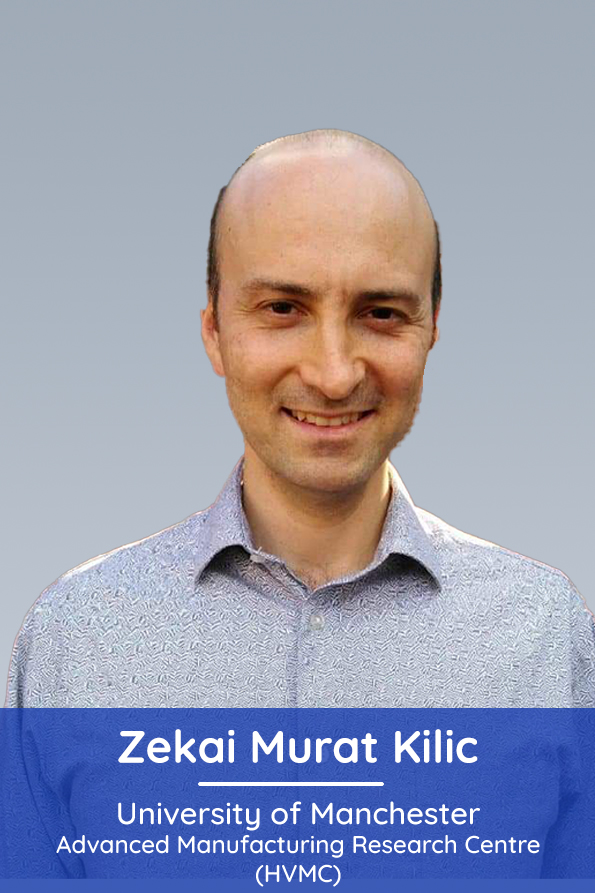
Surface integrity of a machined component determines its fatigue life and corrosion/wear resistance. Moreover, in line with net zero agenda, keeping residual stresses under control is critical for extending service life and reducing life cycle impacts of manufactured components. However, tight residual stresses requirements imposes challenges in achieving a controlled machining process. This project aims to meet this challenge by developing digital models to predict machine dynamics and machining vibrations and their effects on residual stresses in milling. My extensive knowledge in mechanics and dynamics of machining, with high-impact publications in modelling and simulation of vibrations and errors in multiple-axis milling operations, is essential to build such models. The simulation development will require experimental validation, on realistic machines closer to industrial practice. The AMRC is an ideal host to achieve this aim with their industrial outreach and modelling capacity of residual stresses. Moreover, my research will benefit from experimental tests at the AMRC, such as fully instrumented CNC milling machine with real-time process monitoring capacity, and measurement equipment to inspect tool geometry and surface quality. The UK will benefit from implementation in partnership with the AMRC and their industrial partners.
Healthcare & Wellbeing
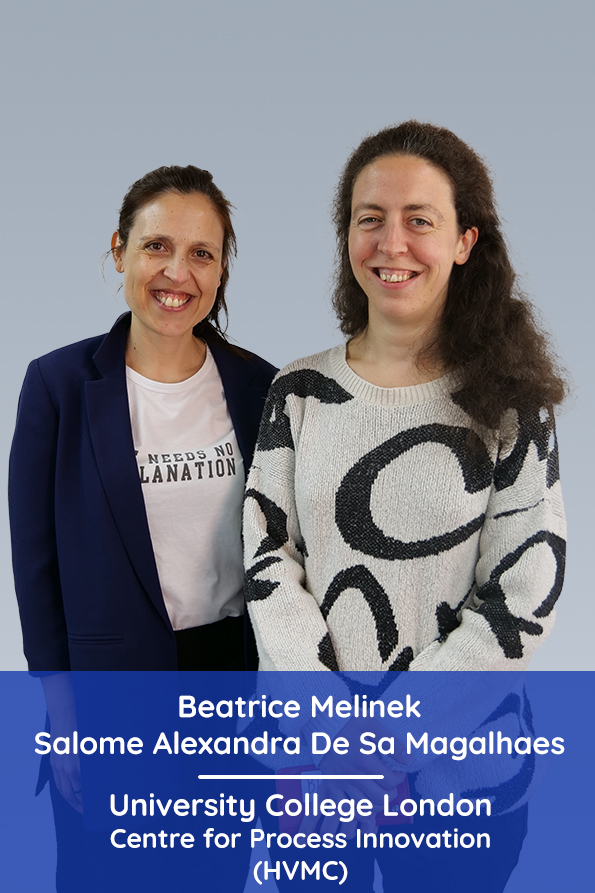
This project focuses on a next generation cell-free manufacturing technique for nucleic acids, which are biomolecules that can be used as medicines. Current manufacturing techniques use cells grown in bio-reactors, whilst “cell-free” methods cut out the middle-men (the cells) by isolating and using the parts of the cells (or viruses / phages) which are responsible for biomolecule construction. This means a manufacturing process that is more akin to a simple chemical reaction, and is thus substantially faster, more productive, and more robust, i.e. reproducible performance and controllable quality.
Protocol maintains the optimum conditions for fast and efficient DNA manufacture without a complicated control system. As such, Salome and Beatrice aim to create and commercialise a compact, standalone, automated device for reliable, predictable and robust production of DNA. Imagine a nespresso machine that produces DNA – with similar size and ease of use.
The Researcher in Residence project with the Centre for Process Innovation will make use of CPI’s expert knowledge and use of their state-of-the art facilities for the development of a flexible purification method or methods. The final form and purity of the DNA will vary according to application. By acquiring exploratory data for a range of chromatography resins this work will give us a valuable starting point for developing further purification protocols for increased business resilience, by allowing us to select alternative, equivalent performance resins and giving the possibility to pivot or expand the range of applications in the future.

Lipid nanoparticles (LNPs) gained considerable interest as drug delivery systems for leading nucleic acid vaccine candidates for COVID-19, such as the mRNA vaccines. LNP vaccines and therapeutics offer the advantage to move from development to clinical trials on much faster timescales than more traditional vaccines and therapeutics, adding to the resilience towards novel viruses in the future.
Despite a strong UK research base and a growing industrial footprint, there are clear gaps around efficient scale-up, manufacture and analysis of LNP based vaccines, which is a key objective of CPI. To solve these challenges, we will apply Digital Twins and Artificial Intelligence (AI) to optimise the precise manufacture of LNP-RNA vaccines. Digital Twins will enable us to replicate processes without the need for expensive physical experiments while the AI enables us to find optimal parameters for a specific set of inputs.
We will use several industrially relevant microfluidic flow reactors and experiments to validate the Digital Twins and AI. We will also add sensors (e.g. pressure, temperature) to gather data for the AI and help understand how the mixing process could be accurately modelled in a Digital Twin.
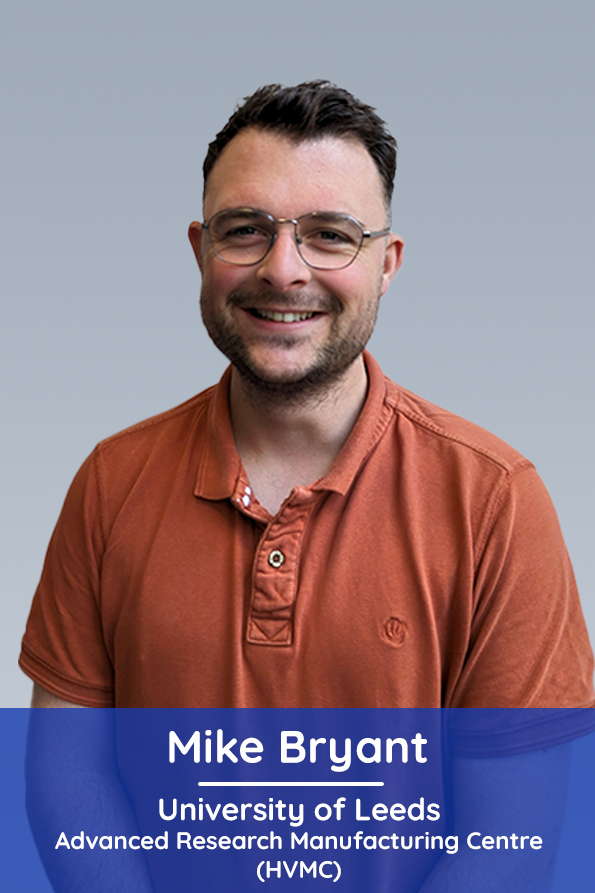
Pre-clinical testing of new medical devices is crucial for the safe introduction of medical devices. Confident prediction of medical device performance (e.g. wear/corrosion) preclinically is the holy grail to medical device manufacturers. However, scrutiny has been placed on medical device manufacturers and testing standards due to the recent spate of high profile failures, notably the metal on metal hip debacle, which could have been isolated pre-clinically.
There is a clear need for clinically-relevant preclinical testing. The reality is complex. With more complex testing scenarios, comes new equipment costs, testing-time and an infinite number of debatable surgeon-implant-patient variables/interactions. Urgency exists for a coherent framework that merges real-world patient data with digital and experimental technologies for accelerated but safer product development.
SPEED aims to combine compound degradation digital-twin capabilities to identify and interrogate ‘worst-case/high-risk’ parameter spaces pertaining to medical device performance. Outcomes will be used to stratify and develop clinically relevant test scenarios using advanced biomechanical hardware with in-situ condition monitoring. SPEED represents a catapult pull, aligning with the AMRC HVM Catapult programme for ‘Virtual Prototyping for Accelerated Sustainable Product Design’ by reducing the need expensive/arduous testing (including animal products) and provides a validated framework for assessing current/future implant designs using clinically representative conditions.

This project will innovate sustainable e-textiles as wearable Point-of-Care (PoC) platform technologies for the elderly population that will enable continuous monitoring of vital signs and round-the-clock treatment protocols. The proposed project will leverage the PI’s substantial prior research experience with scalable and digital manufacturing of graphene-based e-textiles as well as CPI’s (the host Catapult) excellent expertise and facilities on flexible electronics production and assembly processes to industrially relevant volumes. The project aims to deliver highly durable, machine washable and ultraflexible e-textiles for healthcare uses that are also either biodegradable or recyclable at the end of their useful life by working with clinicians, engineers, manufacturers, regulatory bodies, and end-users. Project beneficiaries will include elderly patients by providing a tool to improve care outcomes; healthcare providers by providing a cost-effective way to deliver continuous health monitoring; UK economy by creating new commercial manufacturing of high value medical items within the UK.

In the development of Cell and Gene Therapy (C>) manufacturing processes, there is an effort across the industry to capture data using conventional and innovative sensors or analytical tools (PAT devices), and to use such data to eventually monitor and control manufacturing in real-time.
The Cell and Gene Therapy (CGT) Catapult is investing in such Process Analytical Technology (PAT) strategies and recently completed an extensive PAT Consortium project which coordinated data acquisition from different PAT devices. These novel analytics have generated large volumes of complex and high-dimensional data. This proposal aims to develop advanced data analytics to extract useful and actionable information from this data. The proposal will evaluate the feasibility of combining these tools with advanced mathematical models (e.g., digital twins and hybrid models) to enable adaptive and real-time control strategies for various C> manufacturing processes (e.g., immunotherapies, stem cells, and viral vectors). Proposed data analytics will also quantify the ability of offline analytical devices to predict the relevant critical process parameters (CPPs) and critical quality attributes (CQAs) specific to a C> manufacturing process. The proposal leverages advanced data analysis and mathematical modelling expertise from academia to fully exploit this valuable data resource with the aim of advancing real-time, data-driven, adaptive manufacture control within the C> sector .In collaboration with CGT Catapult, the objective is the development of a novel control strategy that optimises the manufacture process and minimises product quality deviations.

The efficacy of messenger ribonucleic acid (mRNA) vaccines is now well demonstrated, leading to the use of mRNA-based COVID-19 vaccines delivered using lipid nanoparticles. Lipid nanoparticles (LNPs) are a vital component of these vaccines as they protect the mRNA from degradation in the body and mediate delivery into the cytoplasm of cells. An additional advantage of LNPs is the interchangeability of the lipid components and the mRNA incorporated, which allows for this to be a highly modular platform technology. Generally, LNPs are comprised of various ratios of a neutral structural lipid, cholesterol, a PEG-lipid (to control particle size) and an ionisable lipid (which is cationic at low pH and thus binds the mRNA and near-neutral charge at physiological pH). However, there is a wide range of choices to consider when designing an optimal mRNA-LNP formulation, and the impact of the lipid choice selected is not well understood. Therefore, this project aims to support the implementation of high-throughput screening and characterisation of LNPs for mRNA delivery within CPI. This will involve: 1) high-throughput preparation of LNPs, 2) high-throughput analytical characterisation of LNPs, and 3) translation of these results to scale-up manufacturing processes. The deliverable of this programme will be the implementation of high-throughput screening to optimise LNPs, which offers significant savings in time and resources and de-risks early-stage LNP formulation development.